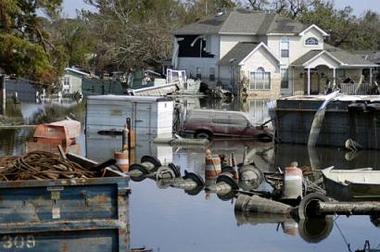A Dozen Thoughts on the Katrina Crisis Thus Far

A neighborhood damaged by Hurricane Katrina sits flooded Tuesday, Sept. 13, 2005, in New Orleans. (AP Photo/Mike Wintroath)
Jim Jewell of Rooftop Blog has articulated A Dozen Thoughts on the Katrina Crisis Thus Far
Although I've been paying attention to our national disaster, I have been too busy to write much, partially because I have clients that are responding to the Katrina devastation.
Here are 12 thoughts on the hurricane-force disaster, responses, and politics.
1. Recognize Personal Responsibility: Perhaps the most important lesson of the last week is that we are all responsible for ourselves and for our families, and in a society that works people take care of their neighbors. We should not expect the government to come to our rescue; although it may be able to, it is by nature a slow-moving bureaucracy.
It will be years before people ignore hurricane warnings again. The people in New Orleans who were the greatest victims were those who chose not to act responsibly, and those who were unable to leave. The fact that friends and relatives did not help the old and disabled-and that there were more looters than good neighbors--reflects the utter failure of community.
2. Make Changes at FEMA: FEMA chief Mike Brown must resign because he is now a symbol of a bureaucracy caught acting like one. I'm sure he's a fine guy and that he didn�t intend to harm anyone, but he is in now as politically toxic as the New Orleans sludge. Politics is largely perception. The foot-dragging at FEMA costs lives--this reality is heartbreaking and the political perception is even worse. Brown's resignation should be on Bush�s desk shortly; and Bush should accept it with all the right regrets. There is no reasonable alternative.
3. Look to the Private Sector. Salvation for the victims of Katrina will come from the good people of the nation driven by a moral impulse to help those in need, and from the private institutions they support—-from local churches to large agencies such as The Salvation Army and Samaritan’s Purse. These private groups can pull together the “little platoons” of compassion and head to the gulf for a weekend of building or a decade of support.
4. Don’t Forget Mississippi: The most old-fashioned hurricane devastation is not in Louisiana, but the Gulf Coast of Mississippi. Biloxi and Gulfport are virtually destroyed and need massive assistance.
Read the balance here

No comments:
Post a Comment